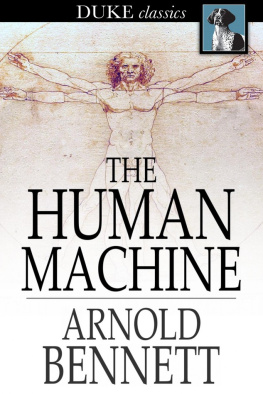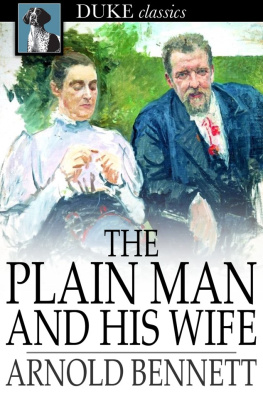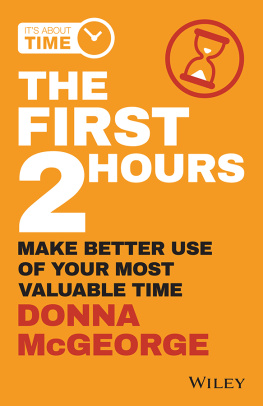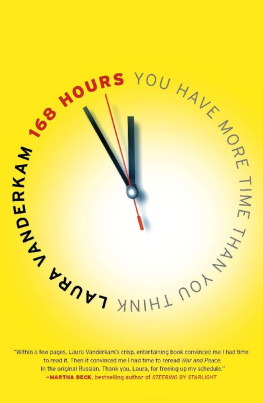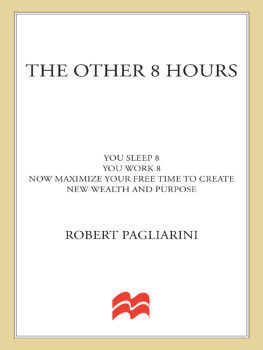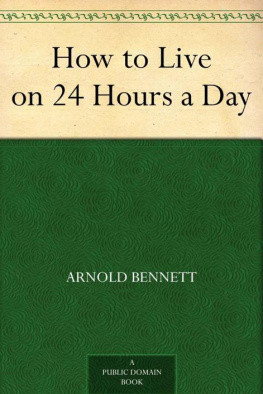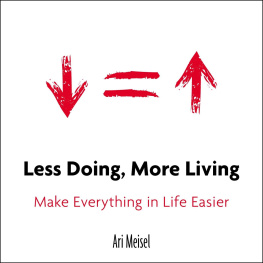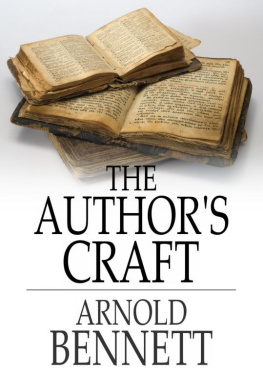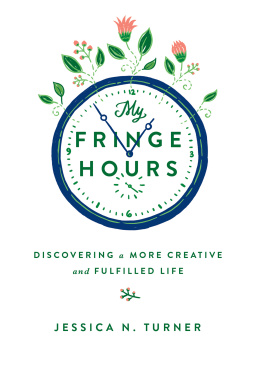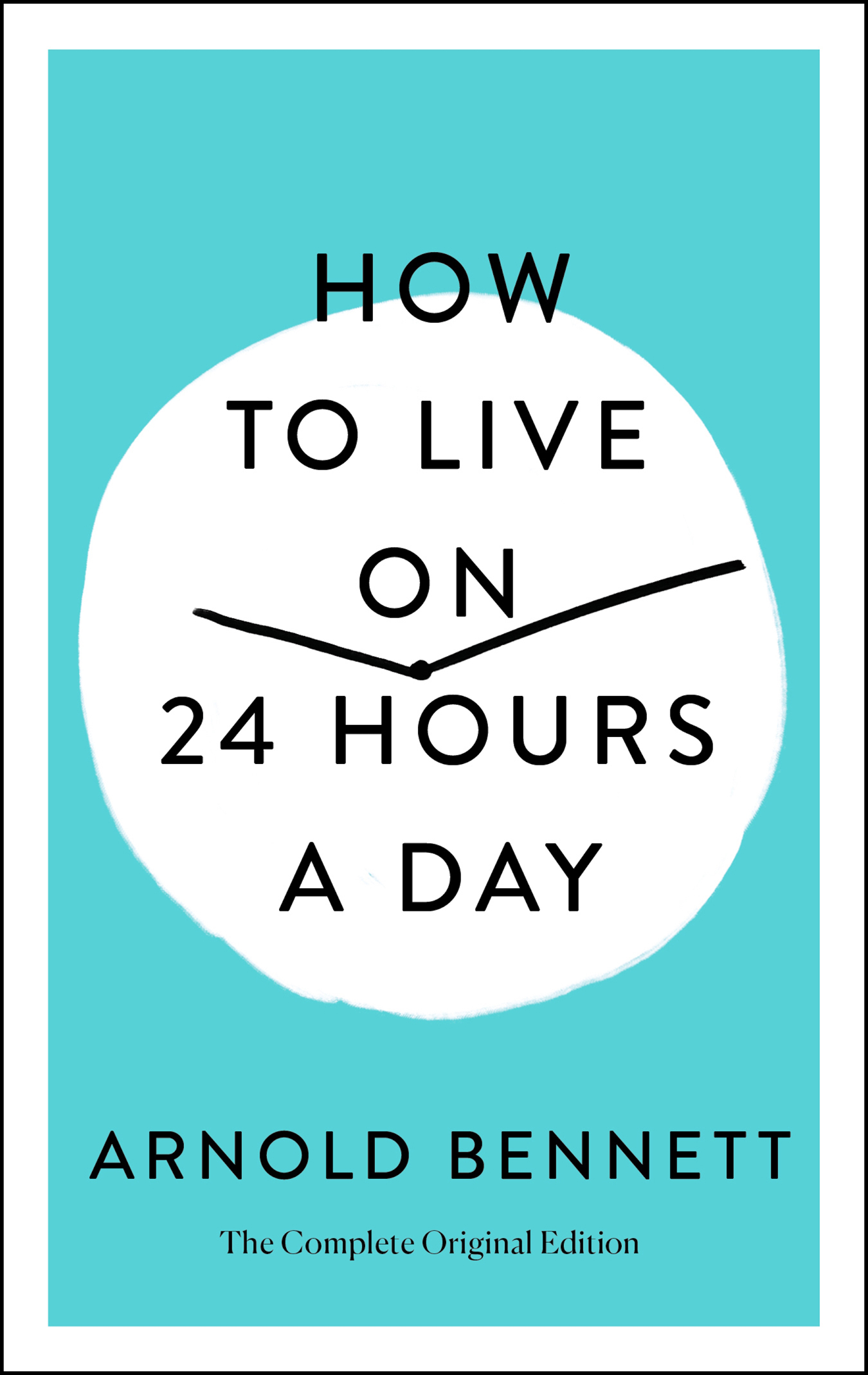The author and publisher have provided this e-book to you for your personal use only. You may not make this e-book publicly available in any way. Copyright infringement is against the law. If you believe the copy of this e-book you are reading infringes on the authors copyright, please notify the publisher at: us.macmillanusa.com/piracy.
BY JOEL FOTINOS
How to Live on 24 Hours a Day, by Arnold Bennett, was originally published in 1910, and has not been out of print since. It has influenced people from all walks of life, all around the world, and sold millions of copies. But what could a book published more than a century ago teach us in the 21st Century? After all, our lives are busier and more complicated than ever before. In fact, sometimes it feels like time is moving faster and faster. Many people complain that they dont have enough time to do the things they want to do.
As it turns out, life in the 21st Century, as different on the surface as it seems, isnt that different from life in the early 1900s. The issues of feeling overwhelmed, having too little time, and even procrastination, were common themes then. The times may look different now than they did then, but the issue of time turns out to be, well, timeless.
How to Live on 24 Hours a Day is remarkably right on time with its message. The language and some of the examples the author uses in the book can sound dated, but the concepts havent aged a bit. Many people might say time is precious, but Bennett goes one step further and says that time is actually like currency. Every day we get exactly 24 hours to spend. Everyone gets the same amount, but not everyone spends their hours the same way.
To maximize our time, Bennett writes, we should divide our time into our work day (8 hours), and our personal day (16 hours). Then we take that 16 hours and budget it, like we would money. Bennett shows how we each can find extra time in our day, what to cut out from our lives, and what to focus on. And what should we do with the extra time that we can find? Bennett urges us to use that time to better ourselves, with great art or actions that make our lives deeper and richer, which in turn allows us to cherish and savor each hour of our day, rather than feel like time is slipping through our fingers. We are in control of our daily allotment of time, rather than feeling helpless.
Who was Arnold Bennett? Born in the UK in 1867, over the course of his life he became a magazine editor, a successful novelist, and even the Director of Propaganda for France during World War I. Many of his novels were worldwide bestsellers. He wrote some nonfiction as well, and How to Live on 24 Hours a Day is one of these books. While his novels and other books seem to have gone out of fashion and faded from popularity, How to Live on 24 Hours a Day has gone on to reach generation after generation with its practical information.
As you read, pay attention to his ideas and program, rather than to the dated examples. Reading through How to Live on 24 Hours a Day doesnt take a long time, but the lessons of this book could have a positive effect on you for the rest of your life.
This preface, though placed at the beginning, as a preface must be, should be read at the end of the book.
I have received a large amount of correspondence concerning this small work, and many reviews of itsome of them nearly as long as the book itselfhave been printed. But scarcely any of the comment has been adverse. Some people have objected to a frivolity of tone; but as the tone is not, in my opinion, at all frivolous, this objection did not impress me; and had no weightier reproach been put forward I might almost have been persuaded that the volume was flawless! A more serious stricture has, however, been offerednot in the press, but by sundry obviously sincere correspondentsand I must deal with it. A reference to page 20 will show that I anticipated and feared this disapprobation. The sentence against which protests have been made is as follows:In the majority of instances he [the typical man] does not precisely feel a passion for his business; at best he does not dislike it. He begins his business functions with some reluctance, as late as he can, and he ends them with joy, as early as he can. And his engines, while he is engaged in his business, are seldom at their full h.p.
I am assured, in accents of unmistakable sincerity, that there are many business mennot merely those in high positions or with fine prospects, but modest subordinates with no hope of ever being much better offwho do enjoy their business functions, who do not shirk them, who do not arrive at the office as late as possible and depart as early as possible, who, in a word, put the whole of their force into their days work and are genuinely fatigued at the end thereof.
I am ready to believe it. I do believe it. I know it. I always knew it. Both in London and in the provinces it has been my lot to spend long years in subordinate situations of business; and the fact did not escape me that a certain proportion of my peers showed what amounted to an honest passion for their duties, and that while engaged in those duties they were really living to the fullest extent of which they were capable. But I remain convinced that these fortunate and happy individuals (happier perhaps than they guessed) did not and do not constitute a majority, or anything like a majority. I remain convinced that the majority of decent average conscientious men of business (men with aspirations and ideals) do not as a rule go home of a night genuinely tired. I remain convinced that they put not as much but as little of themselves as they conscientiously can into the earning of a livelihood, and that their vocation bores rather than interests them.
Nevertheless, I admit that the minority is of sufficient importance to merit attention, and that I ought not to have ignored it so completely as I did do. The whole difficulty of the hard-working minority was put in a single colloquial sentence by one of my correspondents. He wrote: I am just as keen as anyone on doing something to exceed my program, but allow me to tell you that when I get home at six thirty p.m. I am not anything like so fresh as you seem to imagine.
Now I must point out that the case of the minority, who throw themselves with passion and gusto into their daily business task, is infinitely less deplorable than the case of the majority, who go half-heartedly and feebly through their official day. The former are less in need of advice how to live. At any rate during their official day of, say, eight hours they are really alive; their engines are giving the full indicated h.p. The other eight working hours of their day may be badly organized, or even frittered away; but it is less disastrous to waste eight hours a day than sixteen hours a day; it is better to have lived a bit than never to have lived at all. The real tragedy is the tragedy of the man who is braced to effort neither in the office nor out of it, and to this man this book is primarily addressed. But, says the other and more fortunate man, although my ordinary program is bigger than his, I want to exceed my program too! I am living a bit; I want to live more. But I really cant do another days work on the top of my official day.
The fact is, I, the author, ought to have foreseen that I should appeal most strongly to those who already had an interest in existence. It is always the man who has tasted life who demands more of it. And it is always the man who never gets out of bed who is the most difficult to rouse.


